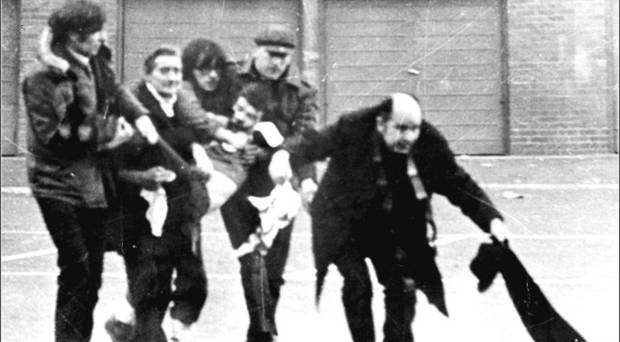
Bishop Edward Daly carryinig a white handkerchief on Bloody Sunday in January 1972
Prosecutors have been deciding if charges will be brought against 15 former British soldiers and an alleged IRA member.
Thirteen people were shot dead when soldiers opened fire on marchers during a civil rights march in Derry on January 30, 1972.
The PPS previously explained that consideration was being given as to whether the Test for Prosecution was met in respect of allegations that those reported to it by the PSNI had given false evidence in connection with the Saville Inquiry into the killings on Bloody Sunday.
The prosecution team, which included senior independent counsel, considered all the available evidence in the investigation file and the content of the report of the Saville Inquiry in respect of allegations of the giving of false evidence.
PPS Senior Public Prosecutor John O’Neill said in a statement today: “All decisions on whether or not to prosecute are taken by independently and impartially applying the Test for Prosecution.
“The standard of proof needed for a criminal prosecution is high. For a conviction, the prosecution must establish beyond a reasonable doubt, through available and admissible evidence, the commission of a criminal offence by the suspect.
“After careful consideration, it has been concluded that the available evidence in this case is insufficient to provide a reasonable prospect of obtaining a conviction of any suspect for offences in relation to the giving of false evidence.
“The decision-making involved the consideration of a vast amount of material.
“Consideration of the allegations of false evidence presented particularly complex evidential and legal issues, all of which were thoroughly analysed by the prosecution team.”
He added: “Three particular issues arose. Firstly, although the Bloody Sunday Inquiry may have rejected the evidence of individuals, it did not always express those findings in terms amounting to the criminal standard of proof. That is the standard which the PPS must consider.
“Secondly, many of the findings related to the rejection of accounts given by former soldiers in 1972. The PPS has concluded that, for a number of legal reasons, those accounts from 1972 would not be admissible in criminal proceedings today.
“Thirdly, the full amount of evidence upon which the Bloody Sunday Inquiry based its findings is not generally available to the prosecution today. Issues arise in respect of the admissibility of evidence and its availability, since not all witnesses who provided evidence to the Inquiry provided witness statements to the PSNI.”
The PPS made clear that these decisions not to prosecute “in no way undermine the findings of the Bloody Sunday Inquiry that those killed or injured were not posing a threat to any of the soldiers.”
The PPS statement concluded: “We acknowledge that these prosecutorial decisions will be disappointing to the victims and families involved, and that this may be another difficult day for them. We have written to them to explain in detail the reasons for the decisions.
“We would like to provide assurance that these decisions were taken impartially, independently and only after the most thorough and careful consideration of all available evidence and the relevant legal issues.”
Tags:




